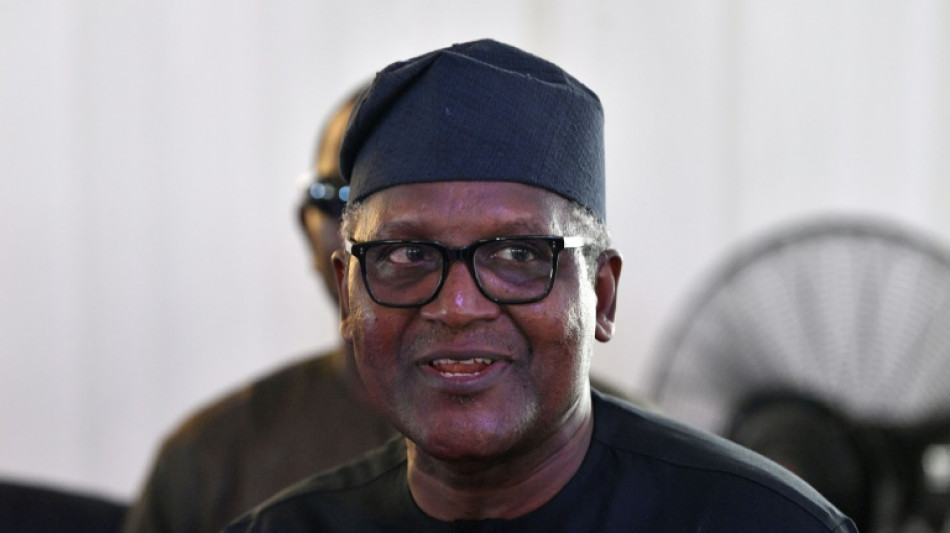
-
 Star designer Rousteing quits fashion group Balmain
Star designer Rousteing quits fashion group Balmain
-
Mexico's Sheinbaum steps up cartel fight after murder of anti-narco mayor

-
 Attack on funeral in Sudan's Kordofan region kills 40: UN
Attack on funeral in Sudan's Kordofan region kills 40: UN
-
Key PSG trio set for spell on sidelines

-
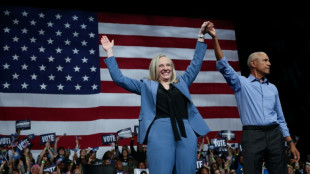 Democrats punch back in US elections - and see hope for 2026
Democrats punch back in US elections - and see hope for 2026
-
BMW reports rising profitability, shares jump
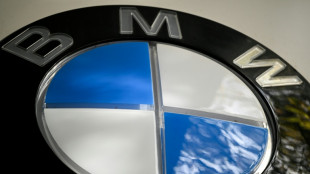
-
 US Supreme Court debates legality of Trump's tariffs
US Supreme Court debates legality of Trump's tariffs
-
Bolivia Supreme Court orders release of jailed ex-president Jeanine Anez
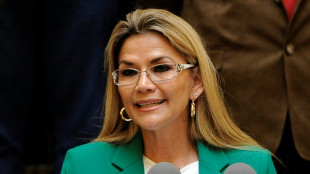
-
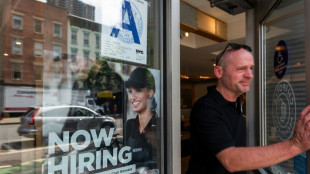 Wall Street stocks rise after positive jobs data
Wall Street stocks rise after positive jobs data
-
'Hostage diplomacy': longstanding Iran tactic presenting dilemma for West
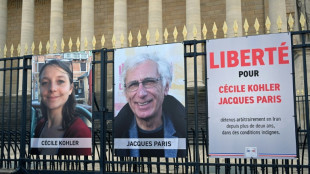
-
 Rybakina stays perfect at WTA Finals with win over alternate Alexandrova
Rybakina stays perfect at WTA Finals with win over alternate Alexandrova
-
Le Garrec welcomes Dupont help in training for Springboks showdown

-
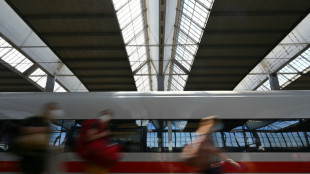 Brussels wants high-speed rail linking EU capitals by 2040
Brussels wants high-speed rail linking EU capitals by 2040
-
Swiss business chiefs met Trump on tariffs: Bern

-
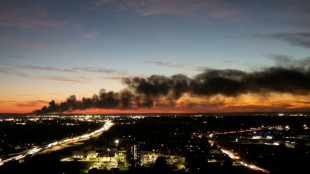 At least 9 dead after cargo plane crashes near Louisville airport
At least 9 dead after cargo plane crashes near Louisville airport
-
France moves to suspend Shein website as first store opens in Paris

-
 Spain's exiled king recounts history, scandals in wistful memoir
Spain's exiled king recounts history, scandals in wistful memoir
-
Wall Street stocks steady after positive jobs data
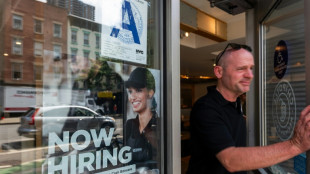
-
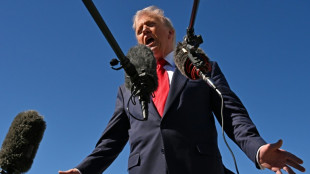 Trump blasts Democrats as government shutdown becomes longest ever
Trump blasts Democrats as government shutdown becomes longest ever
-
Indian pilgrims find 'warm welcome' in Pakistan despite tensions

-
 Inter and AC Milan complete purchase of San Siro
Inter and AC Milan complete purchase of San Siro
-
Swedish authorities inspect worksite conditions at steel startup Stegra

-
 Keys withdraws from WTA Finals with illness
Keys withdraws from WTA Finals with illness
-
Prince Harry says proud to be British despite new life in US

-
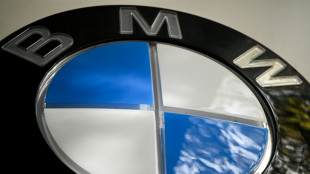 BMW boosts profitability, welcomes Nexperia signals
BMW boosts profitability, welcomes Nexperia signals
-
EU strikes last-ditch deal on climate targets as COP30 looms

-
 Stocks retreat as tech bubble fears grow
Stocks retreat as tech bubble fears grow
-
Shein opens first permanent store amid heavy police presence

-
 West Indies edge New Zealand despite Santner brilliance
West Indies edge New Zealand despite Santner brilliance
-
French pair released by Iran await return home

-
 German factory orders up but outlook still muted
German factory orders up but outlook still muted
-
Death toll tops 100 as Philippines digs out after typhoon

-
 Attack on key city in Sudan's Kordofan region kills 40: UN
Attack on key city in Sudan's Kordofan region kills 40: UN
-
'No one could stop it': Sudanese describe mass rapes while fleeing El-Fasher

-
 Champagne and cheers across New York as Mamdani soars to victory
Champagne and cheers across New York as Mamdani soars to victory
-
Medieval tower collapse adds to Italy's workplace toll

-
 BMW boosts profitability despite China, tariff woes
BMW boosts profitability despite China, tariff woes
-
South Africa's Wiese wary of 'hurt' France before re-match

-
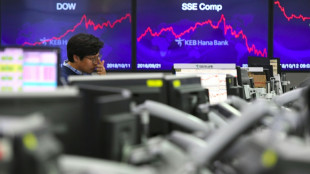 Asian markets sink as tech bubble fears grow
Asian markets sink as tech bubble fears grow
-
Beyond limits: Croatian freediver's breathtaking record

-
 Tottenham supporting Udogie after alleged gun threat in London
Tottenham supporting Udogie after alleged gun threat in London
-
Thunder roll Clippers to stay unbeaten as SGA keeps streak alive

-
 In appeal, Australian mushroom murderer alleges 'miscarriage of justice'
In appeal, Australian mushroom murderer alleges 'miscarriage of justice'
-
Toyota hikes profit forecasts 'despite US tariffs'

-
 Typhoon death toll soars past 90 in the Philippines
Typhoon death toll soars past 90 in the Philippines
-
Ex-France lock Willemse challenges Meafou to become 'the bully'

-
 Ukrainians to honour sporting dead by building country they 'died for': minister
Ukrainians to honour sporting dead by building country they 'died for': minister
-
At least 7 dead after UPS cargo plane crashes near Louisville airport

-
 US Supreme Court hears challenge to Trump tariff powers
US Supreme Court hears challenge to Trump tariff powers
-
US government shutdown becomes longest in history


Five things to know about Nigeria's oil sector
Africa's biggest oil refinery will on Friday start direct and free shipping of fuel to retailers in Nigeria, a move expected to disrupt the oil sector in the continent's largest crude producer.
Nigeria's Dangote Refinery says that the plan will boost efficiency by cutting down on intermediaries while providing more competitive options for consumers and retailers such as petrol stations.
Owned by the country's richest man, Aliko Dangote, the 650,000 barrel-per-day capacity refinery launched in 2023, helping knock down prices after a steep hike following the removal of fuel subsidies by the government.
Here are some things to know about Nigeria's oil industry:
- Key economic sector -
Crude was first discovered in Nigeria in 1956 in the southern Niger Delta region. The west African oil giant pumps an average of 1.5 million barrels per day, according to OPEC, but it is still short of its two million bpd target.
Oil accounts for around 62 percent of Nigeria's export earnings and forms a huge chunk of government revenue.
- Longstanding energy crisis -
The industry has for decades been plagued by problems, amongst them high crude oil production costs due to ageing infrastructure, oil theft, corruption and environmental pollution.
Producing crude in Nigeria costs around $30 per barrel, according to the Nigerian National Petroleum Corporation Limited, compared to around $10 in Saudi Arabia. High extraction costs, as well as volatile global oil prices, make it increasingly difficult for Nigeria to stay competitive internationally.
Persistent oil theft -- known locally as bunkering -- has created an unstable environment for investment, causing international oil companies to dump onshore assets.
There are four government-operated refineries with a total capacity of 445,000 bpd, but they have long been hampered by poor maintenance and graft.
State owned oil firm NNPC has long been the subject of allegations of corruption, political interference and mismanagement.
Several of its executives are being investigated by the anti-graft police.
In January, US authorities returned to Nigeria nearly $53 million in illicit money recovered from an ex-petroleum minister.
For decades, Nigeria has been shipping crude to Europe for refining, and the country experienced sporadic fuel shortages until the Dangote refinery came on board, resulting in improved supplies.
Prior to the Dangote refinery coming online, the industry had "largely been structured around (the) interests of well-monied and politically connected middlemen", and it was not in their interests for refining to happen domestically, said SBM Intelligence analyst Ikemesit Effiong.
Upon taking office, President Bola Tinubu scrapped fuel subsidies that were bleeding billions of dollars out of the state coffers. Petrol pump prices jumped more than fivefold, but have since gradually dropped.
- Bypassing traditional distributors -
Dangote is rolling out 4,000 compressed natural gas-powered trucks to distribute petroleum nationwide, in a market where more than 20,000 diesel-powered tankers have operated for decades.
Aside from removing logistics bottlenecks, the initiative will "significantly lower distribution costs and improve fuel availability", and alleviate "inflationary pressures", said Dangote's group spokesman Anthony Chiejina.
But not everyone is happy with the game-changing initiative in the industry. The Independent Petroleum Marketers Association of Nigeria fears the creation of a monopoly.
"In theory, this plan should reduce the cost of petrol distribution," but the drop in the pump prices may not be significant, said Clement Isong, head of the Major Energy Marketers Association of Nigeria.
- Other players -
Some major players acknowledge that Dangote's entry into the industry has impacted their earnings.
Oando group saw its revenue plummet 15 percent in the first six months of 2025, with its group chief executive Wale Tinubu -- who is the president's nephew -- writing that the entity's declining revenue was as a result of slowing petrol imports "into the country due to rising local refining capacity from the Dangote Refinery, a positive development that enhances Nigeria's energy security and self-sufficiency".
TotalEnergies Marketing Nigeria also reported a dip in half-year revenue.
A second privately-owned refinery, BUA is under construction by another Nigerian billionaire, Abdulsamad Rabiu.
- Pollution, accidents -
Nigeria's oil sector has for decades been tainted by environmental pollution where pipeline spills make fishing and farming difficult.
Oil companies blame most of the leaks on sabotage by local criminal gangs vandalising pipelines to steal the crude.
Accidents involving fuel trucks are common in the west African nation, where people often rush to the site of petrol truck wrecks to scoop up spilled fuel -- underscoring the economic precarity many live in despite the oil riches.
B.Khalifa--SF-PST
